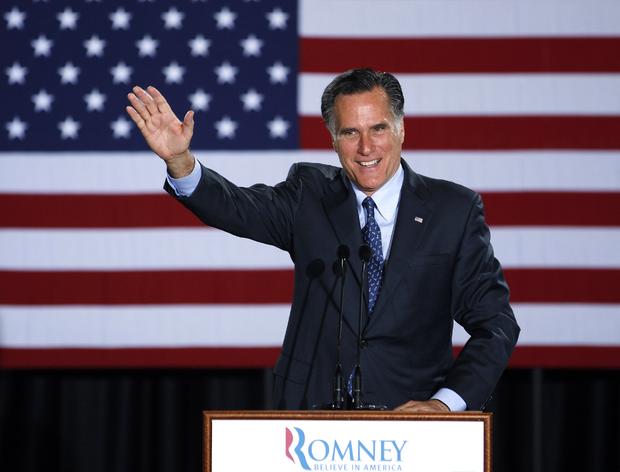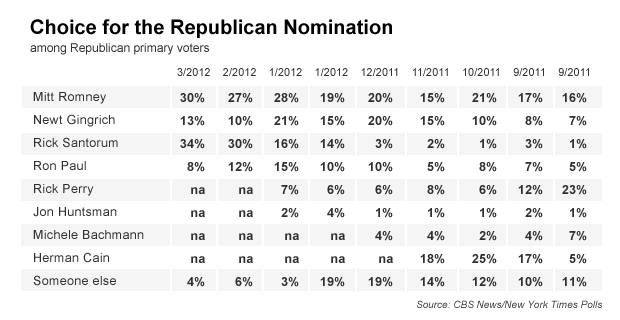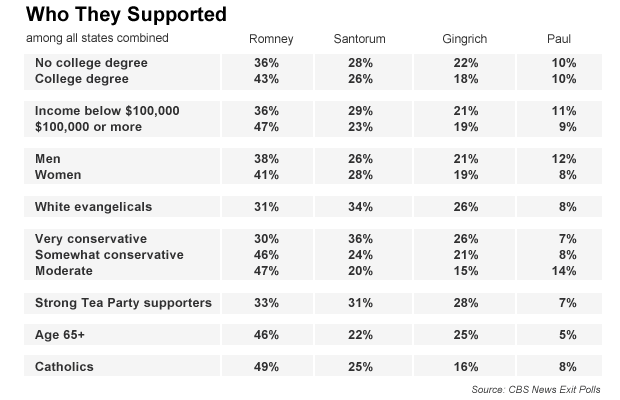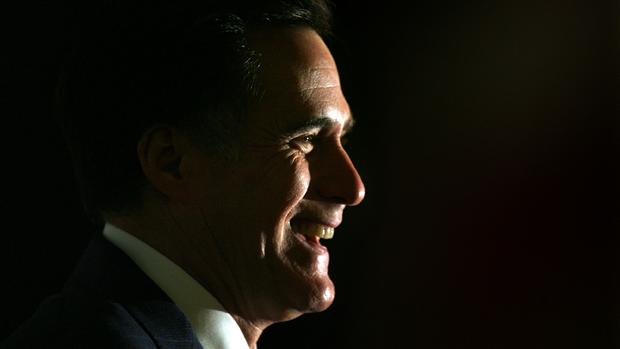How Mitt Romney became the presumptive nominee
Analysis
(CBS News) As Mitt Romney is all-but-assured to win the Republican nomination, the long, curvy road to the top shows a consistent candidate who knew how to win when it mattered most.
In the months leading up to the Iowa caucuses in January - the first contest - Mitt Romney's support remained steady in national polls, while support for other candidates surged and fell. (See graph below showing CBS News and CBS News/New York Times Polls showed Rick Perry, Herman Cain, Newt Gingrich and Rick Santorum surging - and dropping - at various points during the campaign.)
Mitt Romney was the only candidate not to experience such fluctuations in support. He garnered about 15 to 20 percent of Republican primary voters throughout the fall of 2011. While his support never dropped the way it did for other candidates, he was unable to expand it during that time either. But once the primaries began, and he started to win early high-profile contests such as the New Hampshire and Florida primaries, his support in the national polls began to rise, although modestly.
As conservatives, Tea Party supporters and evangelicals bounced from one candidate to another in national polls throughout the fall, moderates, independents, well-educated and wealthier voters consistently supported Romney.
Electability and the Economy: Romney's Strengths
Throughout the campaign, Republican primary voters made it clear that they were looking for a candidate who could defeat President Obama in November; it was the top candidate quality in all states where exit polls were conducted. Voters who picked this quality backed Romney in every state except South Carolina and Georgia, where those electability voters supported Newt Gingrich, who won both states.
Full state-by-state Republican primary results
Even in states where Rick Santorum triumphed, he never won the backing of those who said defeating Mr. Obama was a top priority. Primary voters looking for a true conservative or someone with strong moral character were more likely to support Santorum.
In states where voters were asked directly which candidate had the best chance of defeating President Obama, 54 percent chose Romney; only 20 percent picked Santorum. Even four in 10 very conservative voters saw Romney as the candidate who could win in the general election.
Romney also won consistent support among voters who thought the economy was the most important issue. Forty-four percent of those economy voters backed the businessman and former governor, about twice as many that supported Santorum (23 percent) or Gingrich (21 percent). Voters who were most concerned about the federal budget deficit, which will likely be an issue in the fall, also supported Romney by a large margin.
Moreover, Romney was able to win in states important to clinching the nomination based on numbers. He won the states that offered a large chunk of delegates like Ohio, Illinois and Florida; Romney also won all the three primaries that awarded their delegates winner-take-all - Florida, Arizona, and the District of Columbia. (Most states allocated their delegates proportionally this year, but this allowed Romney to net some delegates even in states he did not win.)
Complete estimated Republican delegate count
Conservative Credentials and Relatability: Romney's Weaknesses
Exit polls did expose weaknesses for Romney. He's often been criticized for being out of touch with ordinary Americans, and in eight states where voters were asked which candidate best understood average Americans' problems, Romney was the top choice in just two of those states - Florida and Illinois - states that he won by double digits. In Ohio, a state Romney won narrowly, as well as a battleground in the general election, only 22 percent of Republican primary voters picked him as the candidate who best understands the problems of average Americans - 12 points behind Santorum (34 percent).
Also, many voters questioned Romney's conservative credentials. In states where the question was asked, 49 percent of Republican primary voters said Romney's positions were not conservative enough, while fewer (41 percent) described his issue positions as about right. Voters were more likely to say Santorum's views were about right (51 percent).
Very conservative voters were particularly skeptical of Romney's conservatism: seven in 10 of them said Romney's positions were not conservative enough. Six in 10 white evangelicals also held this view.
Neither Romney nor Santorum had especially enthusiastic backing from their supporters. Forty-nine percent of Romney's supporters strongly favored their candidate, but many (42 percent) had reservations about him. Santorum supporters held similar opinions of their candidate. National polls showed Democrats were more enthusiastic than Republicans four years ago, and Romney hopes to close this gap heading into November.
Interestingly, while they received fewer votes than their rivals during the campaign, supporters of Newt Gingrich and Ron Paul were excited about their candidates. Fifty-nine percent of Gingrich supporters strongly favored him, while 52 percent of Paul voters said that about him.
Dissecting the Republican Primary Electorate
CBS News Exit Polls reflect what the national polls showed. In all the states in which exit polling was conducted, Romney was the clear winner among those with college degrees and voters with incomes of $100,000 or more. Romney also won among moderates and those who described themselves as somewhat conservative. He won among both men (by 12 points) and women (by 13 points).
Romney also did well among older voters, getting 46 percent of the votes of those age 65 and over, with just 22 percent going to Santorum.
But Romney faced, and still faces, a challenge winning over evangelical voters and the most conservative voters. In states where those types of voters were more numerous, Santorum or Gingrich often won. Among voters overall, 36 percent of those who described themselves as very conservative (a third of the electorate) voted for Rick Santorum while Romney won just 30 percent of their votes. White evangelicals comprised nearly half of primary voters, and 34 percent of them voted for Santorum, with Romney winning 31 percent.
Religious connection was a factor in the races as well. Despite the presence of two Catholic candidates in the race, Romney won the support of Catholics. However, a third of primary voters overall said it mattered a great deal to them that a candidate shared their religion and those voters went overwhelmingly for Santorum (47 percent). Romney received just 21 percent of their support and Gingrich received 24 percent.
Among white evangelicals, 46 percent said a shared religion mattered a great deal; they voted overwhelmingly for the two Catholic candidates -- Santorum (49 percent) and Newt Gingrich (26 percent). Romney received just 18 percent of their support.
Santorum's support from evangelicals and the most conservative voters helped him win contests, especially in Southern states. But he was unable to expand his support much beyond those groups.
Full CBS News coverage: Mitt Romney



